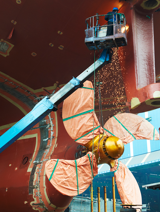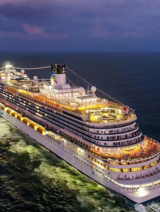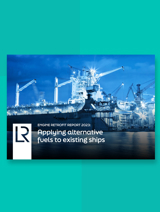As the number of ships able to use alternative fuels grows, so does the need for safe handling of those fuels. Big changes are underway; adaptions of shoreside infrastructure, securing sources of new fuels, and pushing the boundaries of design and construction. But what about those who will operate the new fuel infrastructure? Are crew and ship management personnel sufficiently prepared to manage new risks arising from alternative fuel operation? And are the International Safety Management Code (ISM) Code; Standards of Training, Certification and Watchkeeping for Seafarers (STCW) Convention and Maritime Labour Convention (MLC) sufficiently detailed to support accelerating safe maritime decarbonisation?
That is what the Maritime Technologies Forum (MTF) research, led by LR Lead Marine Consultant Yildiz Williams, a chartered naval architect with extensive experience in advising on marine environmental legislation and sustainability, sought to answer.
Getting ready for change
A recent report commissioned by the Maritime Just Transition Task Force Secretariat predicts a significant rise in the number of seafarers needing training on alternative fuel technologies in the 2040s, between 310,000 and 750,000 people.
“We see that industry has started to transition to alternative fuels already, but we also notice that they're not necessarily ready from a safety and training perspective,” Williams explains, “and that’s paramount, especially for Lloyd’s Register. That's why we thought it is an ideal topic for further research and a report.”
With the number of alternative-fuel ships set to rise considerably over the next few years, now is a perfect time, according to Williams, “for the MTF, which LR is a partner of, to identify these gaps and make suitable recommendations to close them, so our industry can decarbonise safely and efficiently.” Not least because of the industry’s expectation of revisions to the IMO’s GHG Strategy at MEPC80 in July 2023, which may make the regulatory requirements for decarbonisation more stringent.
“We were expecting this to get more challenging in terms of the targets for the industry to meet,” Williams continues, “and therefore it is more important than ever to make sure that, as more operators turn to alternative fuels, the gaps in training and safety are identified and closed. That is what the recommendations from this report seek to do.”
Alternative fuels are not the only method industry is using to meet its decarbonisation ambitions and requirements, but according to Williams, it’s the dominant one. Other methods such as energy saving devices are also important when it comes to training. For example, with the installation of sails, the crew still needs to be trained and competent.


Improving training and safety
The gaps identified by the report are with the ISM Code, STCW Convention and MLC.
The ISM Code is the International Maritime Organisation’s (IMO) international standard that is intended to ensure the safe operation of ships, to prevent human injury and loss of life at sea, and protection of the environment.
“We identified a number of areas of the ISM Code which need additional guidance, largely due to the additional risks associated with alternative fuels and the industry’s lack of familiarisation with them. Due to these additional risks, it is possible some elements of safe operation or hazards could be overlooked.” Williams cites the SMS Procedures as containing key gaps to close, “a guidance document to ensure SMS procedures are sufficiently developed, as well as a list of emergency scenarios, drills and associated guidance developed by industry and submitted to the IMO, would help close some of the gaps.”
The STCW Convention is currently undergoing a comprehensive review but, as Williams makes clear, “the intended output from the comprehensive review is unknown at this point, and it is not known what changes will be made to the Convention nor the timescales for the review to report. Future model training courses only addressing competencies and not including behaviour aspects may not be sufficient to mitigate the risks posed by alternative fuels. Necessary details might not be available possibly because of lack of collaboration from system suppliers due to commercial sensitivities.”
However, it is not just the outcome of the review of STCW Convention which is unknown. It is also unclear which future fuels will be more dominant globally and which fuel related technologies will be adopted.
“Right now, training course developers may not have the commercial incentive to develop alternative fuel courses in advance and for all potential alternative fuels.” According to Williams and the MTF research, public and private funding may be provided to training course developers. Flag states could also review the training materials and audit the training providers to ensure consistent delivery in line with IMO model courses.
Finally, there is the MLC, which establishes minimum requirements for working and living conditions for seafarers. Currently, MLC and international guidelines do not address alternative fuels. For Williams, this may lead to certain health and safety considerations being overlooked by member States; “Reference to alternative fuels could be made in Part B of the Code and international guidelines which will ensure that the member States will address the relevant requirements in their national legislation.”

"We see that industry has started to transition to alternative fuels already, but we also notice that they're not necessarily ready from a safety and training perspective, and that’s paramount, especially for Lloyd’s Register."

Closing the skills gap
Critical gaps exist relating to the safe operation of alternative fuels. Closing those gaps will help to accelerate a safe maritime decarbonisation.
For Williams, “these gaps relate to safety management, crew training and safety culture. The IMO and industry need to collaborate, and this MTF research will help to make that collaboration as effective as possible.”








